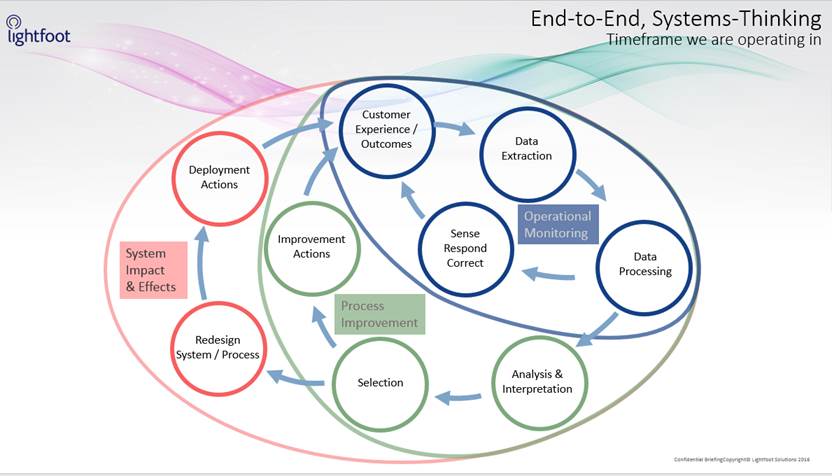The Future of Operational Performance Management – Part 5/5
17/03/2017

“We’ve only held up 3 banks this month”, says Bonnie, “Clyde, our target this month was 5 – get your a**e into gear and hit another 2 before the 31st !”. “You’ve used the ‘Tube’ 3 more times than average this week!”. “I’ve only visited my GP once this year – better get sick again!”
Do criminals really think in terms of months? Do customers really look at their use of transport weekly? Do patients measure their use of services annually? In my experience, the answer is “No” to all of these questions – the world operates 24*365 (and even this constrains our thinking to hours and years!) So why do we measure, say, the volume of crimes per month? Why measure the health of the Underground Network by “Rail Period” (approx. every 4 weeks)? Over the past few weeks, we’ve been looking at what we can learn from 500+ years of Financial Performance Management (where typically they review results monthly or annually) and selectively use to good effect in more rapidly evolving 50+ years of Operational Performance Management.
Over the past few weeks we’ve been comparing Financial Performance Management (over 500+ years) with Operational Performance Management (over 50+ years), and looking for the equivalent approach/technique/information in Financial Performance that can/cannot be usefully adopted for Operational Performance Management.
We posed 3 questions about approach/technique/information:
- Would it contain just a standard set of measures?
- Would it be presented in a standard way?
- Would it be presented on a monthly basis?
The first of 2 of these questions have been answered in previous posts, where we introduced 4 Generic Process Types (the Operational Performance Management equivalent of basic tools such as Profit & Loss Sheet, Balance Sheet etc. in Financial Performance Management), we introduced a standard set of, at most, 10 critical measures required for improving Operational Performance (equivalent to Revenue, Costs, Profit, etc. in Financial Performance Management), and visualised in a standard way using Extended-SPC (with the equivalent of tables of results for this month vs last month / budget / plan etc. in Financial Performance Management). This post will address the final question.
First, a little qualified and respected academic input: “Making Work Systems Better: A Practitioner’s Reflections”, by Luke Hoebeke, 1994. I’ll change his wording to make it more easily consumable for the layman. Most Systems (meaning as in Systems-Thinking, not as in the Incident Management System, Payroll System etc.) work in different ways in different timescales.

Hoebeke introduces more levels, but some may say they are too abstract for most people / situations. Let’s consider the most obvious – 3 levels, namely the Operational Level, Process Improvement Level, Systems Impact Level.:
- Operational Level: Often referred to as Sense & Respond or Implicit Guidance & Control (John Boyd and the OODA Loop). Here the timeframe for events happening is in the seconds / minutes / hours / days depending on the System. Typically, infrastructure assets (e.g. trains or lifts) can change significantly within several seconds or minutes, in a Contact Centre, things can change significantly within a 15-minute period, and certainly hour by hour. Anti-social behaviour can depend on hour of day and day of week. Not much point in looking at these on a monthly basis if we need to “Sense and Respond”.
- Process Improvement Level: Often, the Police implement Initiatives to combat some form of predictable criminal behaviour. An example may be to reduce burglary in student accommodation at the start of each academic year. This may entail looking at the impact on a daily, weekly and monthly basis. We have to give the Initiative a certain amount of time to take effect and exhibit that effect in the burglary results. See example below.
- System Impact Level: This is where seismic changes can substantially rock the System – e.g. the 2011 earthquake in Christchurch New Zealand and its impact on the Healthcare System; Fundamental changes in rules introduced by Her Majesty’s Inspectorate of Constabulary or by the Home Office; Disruptive technology (e.g. internet) being introduced into the Retail Industry, etc. These changes are longer-term changes that may span quarter-years, years or longer. Not much point in looking at these on a monthly basis.
Example of Process Improvement: Initiative to reduce Burglary in a Dwelling in areas with a high population of students: Measurement Frequency (looking for improvement monthly, weekly and daily):
Monthly Perspective:

Weekly Perspective:

Daily Perspective:

Currently, the imposed regular monthly performance review meeting is a hang-over from Financial Performance Management, is looking backwards at what happened, and may have a use in informing stakeholders of the “State of the Nation”. It is Reporting in its most classic of meanings. It has nothing to do with Performance Improvement, and should be considered as something quite separate. Monthly Reporting is definitely one thing we should not be adopting from Financial Performance Management into Operational Performance Management!
So, in answer to the 3 questions above:
- Would it contain just a standard set of measures? Yes
- Would it be presented in a standard way? Yes
- Would it be presented on a monthly basis? No
Categories & Tags:
Leave a comment on this post:
You might also like…
Getting started on your School of Management thesis
Writing a thesis, business plan, internship project or company project can be a daunting task, and you might have some uncertainty or questions around how to get started. This post will share some ideas and ...
Sustainability by royal request: Managing an event fit for a King
The Coronation of King Charles III on May 6th 2023, was watched by millions of people around the world with tens of thousands of people travelling to Central London to witness the pageantry firsthand. ...
Getting started on your Master’s thesis
Please note: This post is intended to provide advice to all students undertaking a thesis in the Schools of Aerospace, Transport and Manufacturing; Water, Energy and Environment, and Defence and Security. There is separate advice ...
Finding your tribe: “Joining the sustainability community was the best decision”
For students on Cranfield’s Sustainability Business Specialist Apprenticeship, community and camaraderie is a vital component for success. Designed in consultation with industry, the part-time Level 7 apprenticeship aims to deepen participants’ knowledge of the ...
“My sustainability studies gave me the confidence to take on Amazon”
Not everyone would have the confidence to challenge a big global power like Amazon but, for Colin Featherstone, Senior Technology Manager and Tech Sustainability Lead at Morrisons, his Cranfield studies equipped him with the ...
My Apprenticeship Journey – Broadening Horizons
Laura, Senior Systems Engineer at a leading aircraft manufacturing company, joined Cranfield on the Systems Engineering Master’s Apprenticeship after initially considering taking a year off from her role to complete an MSc. Apprenticeship over MSc? ...







Most organisations fire fight! Ideally the first level of response is “sense and respond” but organisations do need to go further than that. The process improvement loop is the next step up, but we shouldn’t do this without considering the system wide impacts as best we can. I make that last point as it isn’t always possible to anticipate all the system wide impacts, so we need to be vigilant at this level too.
The end to end system thinking picture above is an important and useful reminder of how we need to view the world and manage our approach to get real value out of performance measurement and management.